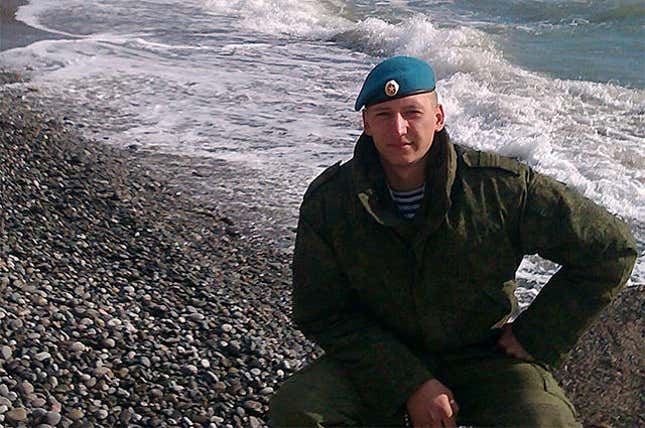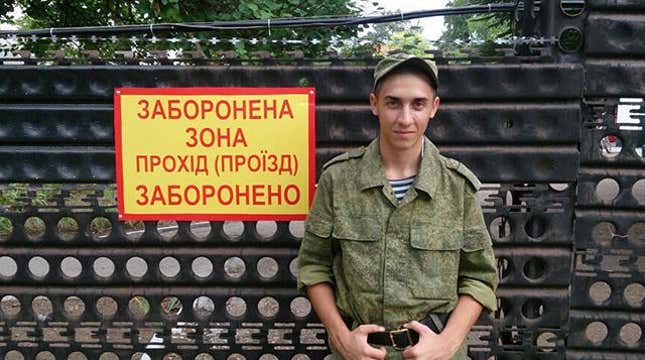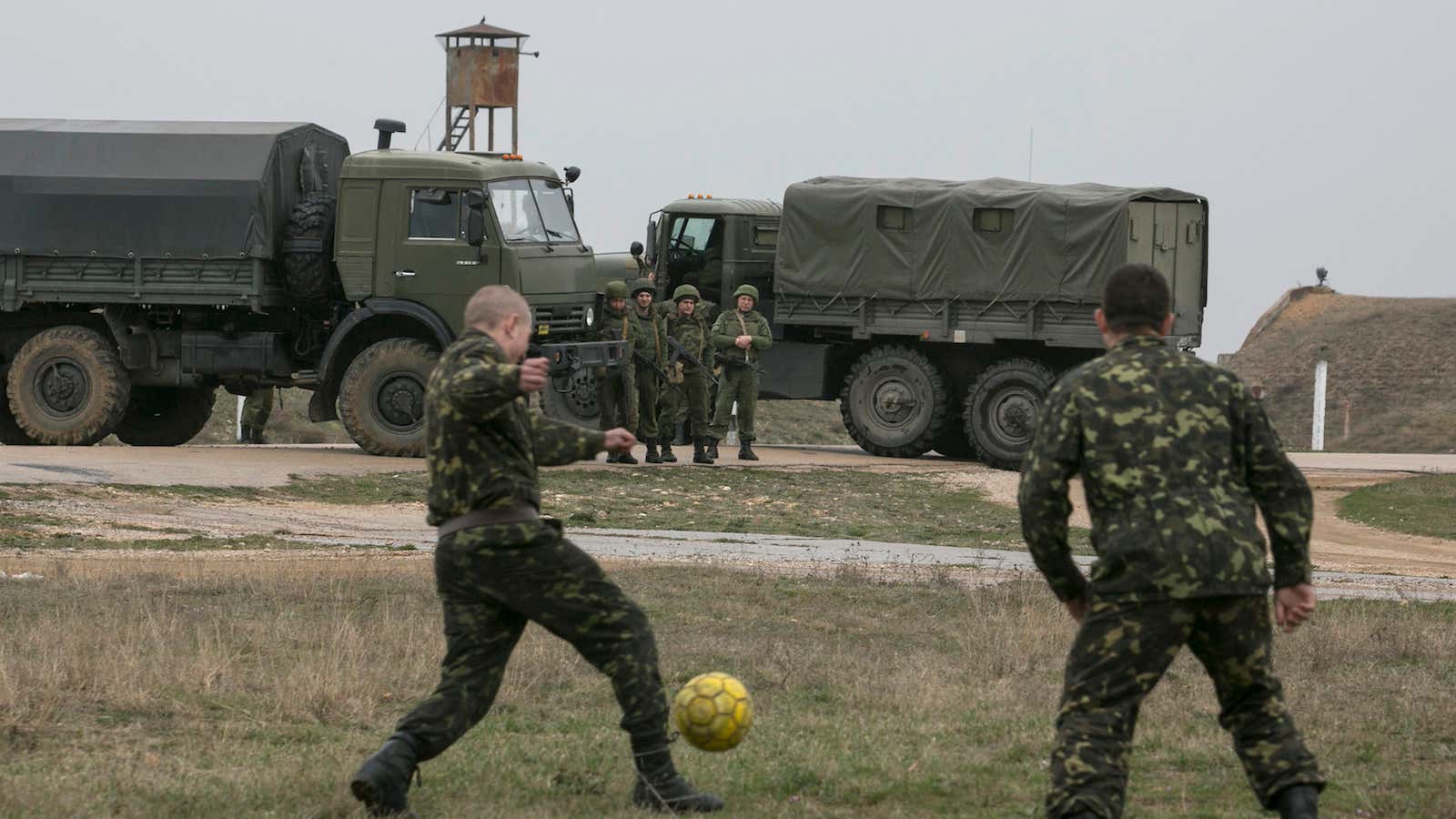“Polite, armed men are in charge of Crimea now,” announced Russian newspaper Nezavisimaya Gazeta about one year ago, on the eve of Crimea’s annexation by Russia.
Mar. 18 marked the one-year anniversary of that controversial referendum that expanded Russian territory into the peninsula on the Black Sea. The anonymous men spotted in Crimea shepherding the process along are now known to have been Russian troops in unmarked uniforms, an admission made in Apr. 2014 by none other than Russian president Vladimir Putin.
However, little else is known about the Russian servicemen deployed in Crimea and their activities before and after the referendum. In a special report for Russian news site Meduza, Dmitry Pashinsky spoke to several Russian nationals who have been awarded medals for their military service with the citation, “For Returning Crimea.” Two of their stories are reprinted here. –Quartz Staff
Oleg Teryushin
Oleg, 23, is a sergeant of the 31st air assault brigade of Ulyanovsk. The brigade was relocated to Crimea from Russia for security purposes in Mar. 2014, when Crimeans voted on seceding from Ukraine and joining the Russian Federation.

I wanted to serve in the military ever since I was a kid. I didn’t even have other career options in mind. I mean, someone has to defend the Motherland, right?
My family actually doesn’t have any connection to the army, but my hometown, Ulyanovsk, where I was born and raised, does. A lot of military people live here, especially paratroopers. That’s why, as soon as I turned 18, practically the next day I went to the military enlistment office without even waiting to get my draft notice in the mail.
At first, I served as a foot soldier in the 419th motorized rifle regiment in the city of Kovrov. After one year, I came back home and almost immediately signed a contract with the paratroopers. That’s how I became a sergeant of the 31st air assault brigade of Ulyanovsk. Now I’m 23, and I’ve spent five years of my life in the military, and another month and a half returning Crimea to Russia.
This year, I’m planning to get into the Ryazan Higher Airborne Command School to keep rising in the ranks, hopefully becoming a lieutenant. The medal I got “for returning Crimea,” though, won’t be much help in getting into the school. Recommendations from the higher ups-are really important, as are my personal traits. The medal is more for my own memory. So I have something to tell my grandchildren.
We were among the first to end up in Crimea on Feb. 24, [2014]. Two days earlier, we awoke to the alarm in our barracks. We formed tactical groups and took planes to Anapa. From Anapa, we rode trucks to Novorossiysk, and from there we took a big landing ship to Sevastopol.
No one aside from our commanders had any idea about the operation to return Crimea to Russia. They just put us in the part of the ship used for cargo. And in the morning we got out onto the shore and realized that we were somewhere in Sevastopol, at the naval station of the Black Sea Fleet.
As soon as we got out onto the shore, we were told to take any symbols and insignia off our uniforms, so that our presence on the peninsula wasn’t so apparent, to avoid panic. We were all given green balaclavas, dark sunglasses, and knee and elbow pads. I think we were some of the first to be called “polite people.” We were allowed to wear insignia with the Russian flag again only after the referendum.
We spent just a few days in Sevastopol. Our main task was to be ready to take on any assignment. Soon after that, our brigade relocated to the village Perevalnoe, where we set up camp. Mostly Ulyanovsk paratroopers camped with us, about 2,000 of them.
This amount was necessary to demonstrate the strength of the Russian military. At this camp, our commanders talked to the Ukrainian side, trying to negotiate a timetable for their surrender. There was a lot of Ukrainian military there before the referendum. But we didn’t have any clashes with them.
The officers had three options: leave the peninsula and go to Ukraine, join the Russian forces while retaining their ranks, (3) quit the military. If I were them, I would have chosen the first option, since I’m a patriot. But there weren’t many of them who did that. Most of them have families in Crimea and they had to join our forces and swear an oath to the Russian flag.
Then again, I remember there was a shooting range near us where two battalions were stationed. Not a single soldier from these two battalions remained. They all went to Ukraine. I really respected that act of patriotism.
On the day of the referendum, Mar. 16, we went on duty with reinforcements. We took our posts early in the morning and tied white ribbons to our sleeves to show that we were peacekeepers, that we weren’t there to start any military aggression. But not everyone agreed with this.
There were constant provocations from the journalists. Not Russian journalists, but Ukrainian, American, and European ones. For example, they would stand in front of our checkpoints and film reports with us in the background, talking about how Russian troops had occupied Crimea. I don’t know English or Ukrainian that well, but I could still understand the gist of what they were saying.
But we didn’t think of ourselves as occupying the peninsula.
We were just carrying out orders and ensuring the security of Crimeans who made their decision to become a part of Russia. They were unhappy with the new government [in Ukraine], with its fascist tendencies, just like they didn’t like the corrupt government of Yanukovych. That’s why the bile of the foreign reporters came from their jealousy towards the triumph of real democracy in Crimea.
Our boys also learned from their relatives and friends in Ukraine that the local news reports really smeared us, saying we were practically shooting people. I guess they were talking about the people who came to our camp every day and said, “Thank you, Russian brothers! Finally we’ll live like we lived before.”
I spent a month and a half in Crimea, in all. I was home by April 12, and in the middle of May I got my medal. I remember, how on the flight home, our commander said, “Well, guys, you really made history!” Everyone in the airplane stood up and sang the national anthem. Unforgettable!
Alexei Karuna
From 2013 to 2014, 20-year-old Alexei Karuna served in the Black Sea Fleet, and was awarded a medal “for returning Crimea.” He returned home to Pavlovsk, near Voronezh, a local celebrity. Town newspapers printed his photograph, and schools asked him to appear at “patriotic education” lessons.

I graduated from high school after the ninth grade and enrolled in a railroad technical college, but then I got expelled for fighting. I messed up this one kid, standing up for a girl. I also had bad attendance and acted out. We had to wear the same stupid uniform almost all the time, and I’m by nature a free-spirited person who isn’t used to taking orders. I spent some time working in this agricultural business for a little while and then I joined the army.
I’d always looked at army service as something inevitable, like going to the dentist. You just suffer and endure. So dodging conscription was out of the question. I got the call one morning and reported to the recruitment office. After a medical examination, I was declared fit to serve.
“Where do you want to serve?” asked the officer sitting behind a big table.
“Nowhere, to be honest,” I answered.
“What do you mean nowhere?! Everyone wants to serve in the airborne! In the marines! In the Spetsnaz [special forces],” he shouted while chopping the air with his hand. “But you don’t want to serve anywhere!”
In the end, I decided to go to the Crimea, to the “resort.” They said it was warm, there was the sea, the beach, and I would earn a good salary. So I said, okay, let’s go to the Crimea.
When I got to Sevastopol, I did my basic training, and then I was stationed on a military ship positioned at the “wall” on the Black Sea. A month later, I ended up getting a hernia and was hospitalized. I had an operation and wasn’t doing so well.
The remaining ten months, I served as a mechanic in the Black Sea Fleet. Our detachment was stationed in the village of Gvardeiskiy, in the Simferopol region, where the 24th Ground Attack aviation unit is based. Soon, the Air Force captured the airport, and we were moved to Sevastopol.
During my service, we usually had to be “shepherds,” which is army slang meaning that we had to unload and carry things. Almost every day in the Crimea, cargo planes would fly in carrying ammunition. I probably unloaded a whole squadron’s worth of ammo all by myself. I remember once a huge IL-76 flew in, and it took us three days to unload it all. It was jam-packed with barbed wire and I thought that it would be enough to fence in the entire peninsula.
I first heard about the plans to annex the Crimea in early February. We were certainly aware of what was happening in Ukraine, because every night all the soldiers went to watch the news in a dedicated room with a TV. This was mandatory by order. At the same time, our military began to enter Crimea actively. They created and organized patrols to prevent a Maidan movement there, because Crimeans were strongly against the new Ukrainian government.
Hence the idea to join Russia. It didn’t just come into Putin’s mind; the residents of the Crimea wanted it. We talked a lot with the locals, and I know what I’m talking about. When it comes to Sevastopol, there was a Russian tricolor hanging from every balcony.
On the eve of the referendum, we were warned that the alarm would be raised and we had to be ready. The whole day we sat wearing body armor. Provocations were expected from Ukrainian nationalists and the Crimean Tatars. Some of them were for joining the Russian Federation, or rather, they didn’t care whether the future was with the Russians or the Ukrainians. Others wanted Crimea to remain a part of Ukraine.
But everything went very quietly, because so many Russian troops were in such a tiny place!
[Russia’s] Black Sea fleet had 15,000 people, another 20,000 soldiers were on the ground, plus there were the special forces, located in the city. Any resistance would have been crushed. And no one resisted.
In general, we only encountered Ukrainian military personnel when some of them began to cross over to our side, taking the oath. For example, the deputy commander of our unit, a captain of the second rank, was a former Ukrainian officer—a defector. He didn’t like us conscripts. Once he came into the barracks, and one of us ventured to address him.
“Comrade Captain of the second rank, we have few people left. Please reduce the workload.”
“I bet they make you clean your weapons?”
“No, they don’t make us clean our weapons.”
“Well we’ll fix that,” he said.
And he kept his promise, of course. We thought his bias towards us might have been a sort of revenge for the annexation of Crimea.
Many Ukrainian officers defected. Their ships and units were not seized by force. Wherever our troops appeared, they immediately raised the white flag. They were told that those who wished to join the Russian army were welcome to take the oath, and they would keep their ranks. Some went to Ukraine, and some were on our side.
What eventually happened to the Ukrainian ships is a good question. I don’t know. I do know that we unloaded weapons and ammunition from the Ukrainian units. I don’t know about the ships. But I would have really liked to see the ships end up with us. They’re good trophies.
Generally speaking, I’m a big patriot, and I was thrilled to hear the news about Crimea’s return. But most of my colleagues were close to getting out. They had one thought: hurry home. That’s the army for you. I would serve again, if I had the chance. I didn’t end up going to the front lines because that would have taken a whole mountain of paperwork.
During the service, I wrote a request to switch to contract service. I had ten days left on duty, but they didn’t manage to prepare a contract for me in time. Now I’m not really thinking about returning to the army. Our major joked once that he would call me again, if Russia continued reclaiming land from the former Soviet Union.
The medals were awarded on Mar. 28. We were told earlier that morning, so we could put on our dress uniforms, and we lined up on the parade grounds. The unit commander came out with the chief of staff and called each man individually.
“Sailor, Karuna!”
“Present!”
“Step forward to receive your award!”
“Yes sir!”
I took three steps forward and said, “Sailor Karuna, reporting!”
The colonel presented a medal in a box along with a certificate, and in a quiet, fatherly tone says:
“Thank you very much.”
Then you turn 180 degrees and—while saluting—you shout:
“I serve the Russian Federation!”
And, for half the day, that’s how they gave out awards. We wondered if any former members of the Ukrainian military got awards for returning the Crimea. It would have been funny to see.
Now it seems to me that the medal has brought me no good, apart from the emotional thrill and the memories I’ll have for the rest of my life.
On the other hand, we did not serve like others did. My friends come back from the army and I ask them: “How was the service?” And they reply: “Nothing special. We dug out a fence until lunch! We hauled bags!” And though we also hauled bags, we came back with an award. The only thing that marred my service was lower wages.
The fact is that, since the Crimea is considered abroad, we received the 4800 Ukrainian hryvnia for the last month. That was about 20,000 rubles [$320 at today’s exchange rate]. That’s all Russian conscripts get. Many of them were extremely dissatisfied. When I heard about it, I just laughed.
“Well, here’s to returning home to Russia!” I said to myself.
This post is excerpted from a report originally published by Meduza. Follow Meduza on Twitter at @meduza_en.
